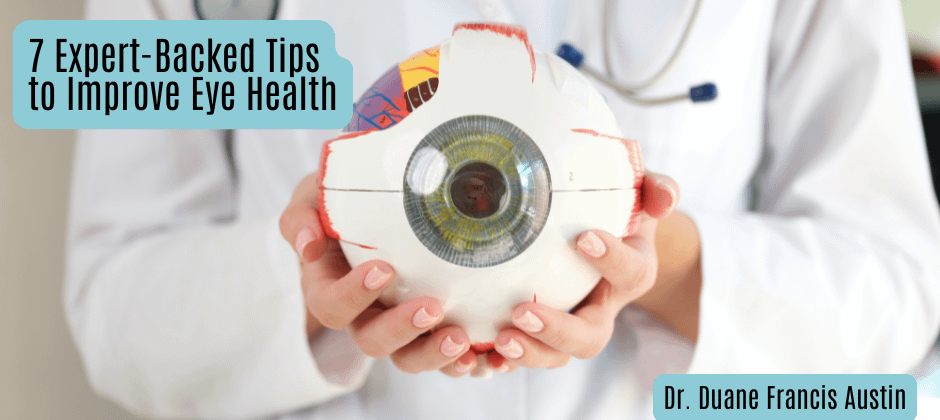
Your eyes are essential to your overall health, and small daily habits can make a big difference in protecting your vision. From maintaining a healthy diet to managing eye strain, these expert-backed tips can help you support long-term eye health and prevent common eye problems.
Can You Improve Your Vision Naturally?
There is no proven way to improve your vision naturally once it starts to deteriorate. However, you can take steps to protect your eyes, prevent further decline, and maintain overall eye health.
While these measures won’t reverse existing vision issues, they are valuable tools for preventing common eye conditions and protecting your vision in the long run.
7 Ways to Improve Eye Health
Get Your Eyes Checked Regularly
Regular eye examinations are crucial for detecting eye conditions such as cataracts, glaucoma, and age-related macular degeneration. Early intervention can prevent these issues from worsening. Adults should have a comprehensive eye exam every two years, or more frequently if advised by an vision care specialist.
Eat a Healthy Diet
Consuming a diet rich in fruits, vegetables, and omega-3 fatty acids supports eye health. Nutrients like lutein and zeaxanthin, found in dark leafy greens, and vitamins C and E can help ward off age-related vision issues. Incorporate foods such as sweet potatoes, carrots, and fish like salmon into your meals to provide essential nutrients for your eyes.
Wear Sunglasses
Protecting your eyes from ultraviolet (UV) rays is essential to prevent cataracts and macular degeneration. Choose sunglasses that block 99% to 100% of both UVA and UVB rays. Wearing sunglasses also shields your eyes from wind and debris, reducing the risk of dry eye and other irritations.
Stop Smoking
Smoking increases the risk of developing eye diseases such as cataracts, age-related macular degeneration, and optic nerve damage. Quitting smoking at any stage can reduce these risks and improve overall eye health. Seek support from healthcare professionals or smoking cessation programs to assist in quitting.
Take Screen Breaks
Prolonged screen time can lead to eye strain, dryness, and discomfort. Implement the 20-20-20 rule: every 20 minutes, look at something 20 feet away for at least 20 seconds. This practice helps reduce eye strain and gives your eyes a chance to relax. Additionally, make certain your screen is at eye level and about an arm’s length away to promote proper posture and reduce strain.
Manage Diabetes
Diabetes can lead to diabetic retinopathy, a condition that damages the blood vessels in the retina. Maintaining healthy blood sugar levels through diet, exercise, and medication can prevent or delay the onset of diabetic retinopathy and other diabetes-related eye problems. Regular eye exams are especially important for individuals with diabetes to monitor for any changes in vision.
Wash Your Hands Frequently
Proper hygiene plays a crucial role in protecting your eyes from infections like conjunctivitis (pink eye) and other irritations. Our hands come into contact with countless germs throughout the day. Touching your eyes without washing them can introduce harmful bacteria or viruses.
Make it a habit to wash your hands thoroughly with soap and water before touching your eyes or handling contact lenses. This simple practice reduces the risk of transferring germs that could cause serious eye problems or infections. Additionally, avoid rubbing your eyes, as this can exacerbate irritation and increase the likelihood of introducing harmful pathogens.
Conclusion
Caring for your eyes is essential for maintaining your overall well-being. By adopting these simple yet effective habits, you can protect your vision and reduce the risk of common eye problems. Remember, your eye health is worth the effort, and these small steps can make a big difference.
Disclaimer: This post is for informational purposes only and is not a substitute for personalized medical advice. Please consult your eye care professional for guidance.

Leave a Reply